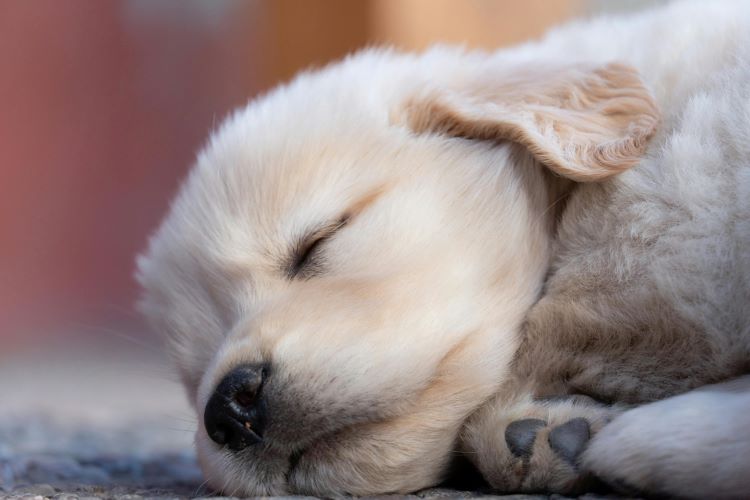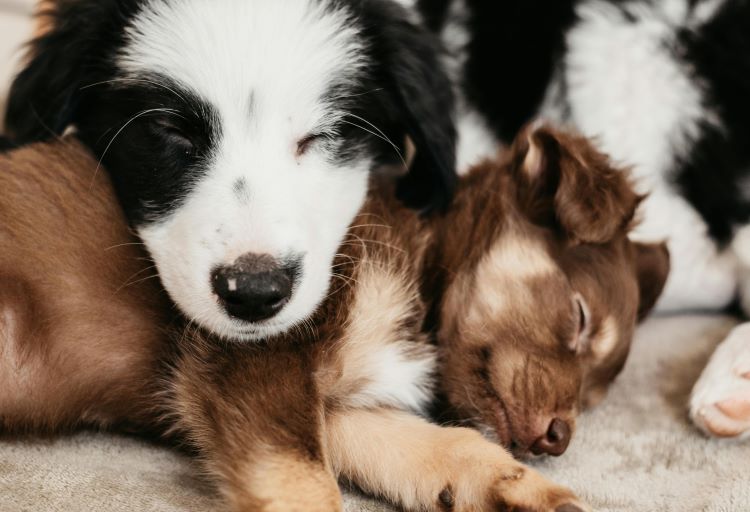Ready to help treat your pet to a healthy life?
How Much Do Puppies Sleep? A Guide by Age
By : Trupanion Staff | Published Jul 2, 2024

When you think of puppies, you probably imagine hours of playtime and active snuggles with your adorable new family member. While puppies and fun go hand in hand, it's all too easy to underestimate the importance of puppy sleep.
Sleepy puppies are normal (not to mention cute), and it's important to establish healthy habits from the get-go and recognize the signs of potential problems with your pup's sleep schedule. Knowing how much puppies sleep can help you prepare for your new puppy and support your pet toward a happy, healthy future.
Why puppy sleep is important
New pet owners are often surprised by how much their puppies sleep, but all that shut-eye helps your new pal develop healthily into a grown adult canine. And in case you’re wondering, puppies do need more sleep than adult dogs thanks to this period of rapid growth. Proper sleep is necessary for healthy muscles, bones, and tissues.
Though it’s not just your puppy's body that needs sleep to develop — their brain also requires plenty of rest to process all the information they absorb during the day. Evidence suggests that dogs can even learn while they sleep. Like us, our pets experience 'sleep spindles' — short bursts of brain activity that help them consolidate memories.
And that’s just the tip of the puppy sleep iceberg. Other reasons it’s so important include:
- Growth hormone production: Puppies produce growth hormones during deep sleep to help them grow and develop.
- Healthy digestion: During sleep, your puppy's body can use more energy for digestion.
- Maintaining energy: Puppies require lots of energy to play and explore, and plenty of sleep lets them recharge.
How much sleep do puppies need by age?
Generally speaking, how much sleep puppies need gradually decreases as they get older. And when they choose to sleep also changes with age. Very young puppies may wake periodically during the night and nap a lot during the day, similar to human babies. But don’t worry — as your puppy gets older, they'll naturally shift toward a less sporadic sleep pattern.
Puppy sleep schedules may also depend on your pet's routine. Very active puppies may need more sleep to replenish their energy stores and process the large amounts of information they encounter during their daily activities. You may also notice your puppy falling asleep after eating because digestion requires a lot of energy.
Knowing how much sleep puppies need by age can help you establish a healthy routine and spot signs of sleep problems in your pup:
Newborn puppy
Newborn puppies sleep more than 22 hours per day on average. Healthy newborns need their mother's milk at least every 2 hours and can't walk or play yet. As a result, they tend to spend most of the day and night napping between feeds.
8-week-old puppy
An 8-week-old puppy grows and learns rapidly and needs plenty of sleep to support development. Expect your pup to sleep for 18 to 20 hours per day.
12-week-old puppy
Your puppy may not need quite as much sleep after hitting the 3-month mark but still needs to snooze for 12 to 16 hours each day. Keep in mind they’ll still likely need a potty break or two during the night.
4-month-old puppy
A 4-month-old puppy still needs around 12 to 16 hours of sleep, but you might start to notice bigger changes in their sleep routines. Pups of this age develop better bladder control, allowing them to start sleeping through the night.
6-month-old puppy
At 6 months old, your puppy's sleep schedule should start to resemble that of an adult dog. Older pups and adult dogs need 10 to 14 hours of sleep per day. However, your puppy may require extra sleep after particularly active or exciting days.
Puppy sleep at 1 year
By the time your puppy reaches their first birthday, they should be settling into a regular adult sleep routine. Often, older puppies’ sleep schedules follow their humans' rest patterns. You can expect your pet to settle down for sleep around when you do and get up early in the morning. In a typical day, dogs tend to be most active before 10 a.m. and after 5 p.m. in the evenings. This will be especially apparent if you work — your pup is likely to be more active when you're at home and rest while you're away.

Is my puppy sleeping too much?
It's common for owners to worry when their puppy sleeps longer or more often than expected. Often, puppy owners underestimate how much sleep puppies need, leading to unnecessary anxiety.
Generally, a puppy sleeping a lot isn't a cause for concern. If your pup appears healthy and playful when awake, they're likely getting the sleep they need for healthy growth and development.
However, helping your puppy establish a healthy routine ensures they get enough exercise and socialization and encourages them to sleep through the night when they're developmentally ready. While it's fine to follow your puppy's lead when they need to sleep, the following tips can help you ensure they enjoy good-quality rest and a balanced lifestyle:
- Ensure your puppy has a safe, comfortable space where they can sleep undisturbed.
- Provide plenty of opportunities for your puppy to play, socialize, and exercise during their waking hours.
- Establish a regular, predictable routine of mealtimes, walks, toilet trips, and playtimes to help your puppy learn healthy sleeping habits.
When to see a veterinarian
Occasionally, problems with puppy sleep may require consulting with a veterinarian. Consistently struggling to sleep could be a sign of a health problem or canine sleep disorder. Regular nighttime wake-ups can likewise affect your own sleep and well-being. If your older pup still wakes you during the night, your vet can check for underlying conditions and provide advice on puppy sleep routines.
While sleeping a lot isn't a cause for concern in healthy puppies, seek veterinary attention if you notice sudden changes in your pup's routine. Suddenly sleeping much more than usual or struggling to sleep could be signs of pain or illness. Breathing difficulties, disinterest in food or play, or other symptoms of being unwell also warrant a trip to the vet for a health checkup.
Learning about puppy sleep can help you support your pup's development, and it's also the ideal time to consider puppy insurance. Covering your dog as a youngster provides peace of mind and can help you maximize the benefits of pet insurance.
